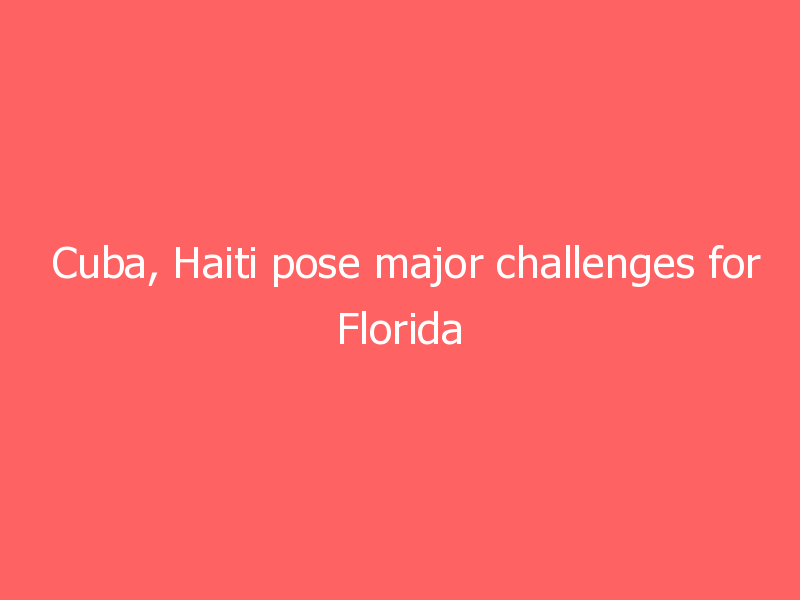Two crises in the Caribbean are emerging as a difficult test for Florida Democrats ahead of the 2022 elections.
For the slate of Democratic candidates hoping to oust Gov. Ron DeSantisRon DeSantisFlorida’s Crist urges Biden to provide direct federal aid to Cuban people White House: Florida accounts for 20 percent of all new COVID-19 infections How Trump can win again: Become the calm, moderate candidate MORE (R) and Sen. Marco RubioMarco Antonio RubioFlorida’s Crist urges Biden to provide direct federal aid to Cuban people Schumer, Tim Scott lead as Senate fundraising pace heats up Biden says US may take steps to restore internet access in Cuba MORE (R) next year, the combination of a historic uprising in Cuba and political instability in Haiti has thrown a new wrinkle into the party’s efforts to stay unified and notch victories in a swing state that has eluded them for years.
“It’s no secret that the Biden administration did not do well in Florida, and it’s a state that they are going to target in 2022 and obviously again in 2024,” said Wazim Mowla, assistant director for the Caribbean Initiative at the Adrienne Arsht Latin America Center with the Atlantic Council.
Florida Democrats have been quick to address the dual crises in Cuba and Haiti.
Rep. Val DemingsValdez (Val) Venita DemingsSchumer, Tim Scott lead as Senate fundraising pace heats up Haiti Caucus: Forging path out of crisis will not be quick, but necessary to avoid false ‘democracy’ The Hill’s Morning Report – Presented by Goldman Sachs – Biden backs Cuban protesters, assails ‘authoritarian regime’ MORE (D-Fla.), who’s challenging Rubio next year, has spent the past several days meeting with Cuban and Haitian community leaders. State Agriculture Commissioner Nikki Fried, one of DeSantis’s Democratic rivals, has called for “liberation” in Cuba.
Meanwhile, Manny Diaz, head of the Florida Democratic Party, is calling on the Biden administration “to coordinate the proper response” to the situation in Cuba.
“I call on all Americans to stand with the Cuban people in this dark hour while their government chooses to repress them instead of tending to their needs,” Diaz said in a statement.
“People in the streets of Havana and Palma Soriano are justly calling for ‘homeland and life’ while waving Cuban and American flags. This is not a partisan issue, but one that should unite our entire community. The people of Cuba need us now.”
But Democrats are contending with stark internal divisions. While Florida Democrats have called on President BidenJoe BidenPence refused to leave Capitol during riot: book Father and son police officers charged with joining Proud Boys at Capitol riot On The Money: Five questions for Democrats on their .5T budget | Retail sales rebound in June despite rising prices MORE to travel to Miami to address the twin crises, the White House has shown no desire to get heavily involved.
On Thursday, Biden threw cold water on Haiti’s request to send U.S. troops to the island to help maintain order, saying that while he would send Marines to bolster security at the U.S. Embassy in Port-au-Prince, deploying troops is “not on the agenda at this moment.”
On Cuba, Biden has praised the protests as a “clarion call for freedom” and denounced violence against demonstrators by the regime, but the White House has refrained from announcing any new actions in response to the unrest.
At the same time, prominent members of the party’s progressive wing, including Rep. Alexandria Ocasio-CortezAlexandria Ocasio-CortezOcasio-Cortez to stump for Turner in Ohio ahead of special election Business, labor groups teaming in high-speed rail push NY progressive Bowman introducing 6B ‘Green New Deal for Public Schools’ MORE (D-N.Y.), have seized on the situation in Cuba to call for an end to the longstanding U.S. embargo, delivering more muted criticism of the island’s repressive communist regime in the process.
The Democratic Progressive Caucus of Florida issued a statement Thursday demanding that the U.S. lift its embargo on Cuba, saying the policy “deprives the Cuban people of resources, contributing to deteriorating infrastructure and poor access to food and basic needs.”
“The Cuban embargo, initially instituted some sixty years ago, is inarguably one of the greatest failures of American foreign policy in modern history,” the caucus said. “As thousands of Cubans take to the streets of Havana and Miami, we must recognize that the conditions pushing them past their breaking points are in no small part exacerbated by the United States’ embargo against Cuba.”
One Democratic consultant in Florida expressed frustration over the message coming from progressives, accusing the party’s left flank of echoing the Cuban Communist Party’s talking points and exposing Democrats to GOP attacks on a crucial political and humanitarian issue.
“This isn’t where the party is,” the consultant said. “But Republicans are going to turn around and say that Democrats are soft on the regime, that we’re all socialists or communists.”
Matt Terrill, a Republican strategist and former consultant for the Florida GOP, said the differing messages coming from Florida Democrats, progressives and the White House point to a larger challenge for the party.
“It is very difficult to go in and win support for your position on an issue – or win elections in general – if you’re not united,” Terrill said. “And right now, Democrats kind of have mixed messaging on their response and leadership on this issue.”
“What we’re seeing is many voters across the state are much more in lockstep with Republicans’ messaging on this compared to Democrats’ messaging,” he added.
Susan MacManus, a political analyst and professor at the University of South Florida, said much of the state’s diverse nonwhite population – including Venezuelans, Hondurans, Nicaraguans, Vietnamese — were all part of the “anti-socialism” coalition built by Republicans in 2020 that helped Trump win the state.
“The socialism issue is not going to die anytime soon here, period,” she said.
Democrats can’t afford any missteps in Florida next year. The state has dealt the party a series of disappointing defeats in recent years, most notably in 2020 when former President TrumpDonald TrumpPence refused to leave Capitol during riot: book Officials arrest ‘Roman gladiator’ who stormed Capitol while filming it for his mom Overnight Defense: Milley reportedly warned Trump against Iran strikes | Pulitzer Prize-winning photographer killed in Afghanistan | 70 percent of active-duty military at least partially vaccinated MORE carried it by more than 3 percentage points, a relative landslide in a state known for its razor-thin election margins.
Meanwhile, Democrats lost control of two key South Florida House seats, driven by a swing toward the GOP in Miami-Dade County, where roughly 7 in 10 residents are Latino, and Cuban Americans are a critical voting bloc.
Trump, who has yet to rule out a possible 2024 presidential run while wielding his influence in competitive congressional races, has pounced on Democrats and the Biden administration amid the recent unrest in Cuba, casting them as unwilling to “take a stand against violent Communism.”
But GOP candidates aren’t letting Trump do all the talking for them.
Rubio, the son of Cuban immigrants, has been laser-focused on Cuba in recent days, regularly tweeting out clips of protests on the island and extolling the need for a more forceful posture toward Havana. He has also joined DeSantis and other officials in calling on the Biden administration to help preserve internet access for protesters in Cuba.
In a state that is inextricably linked to its neighbors in the Caribbean, the crises in Cuba and Haiti have a particular resonance. For days, protesters have taken to the streets in Florida to call for an end to the communist regime in Cuba.
Meanwhile, leaders in Florida’s vast Democratic-leaning Haitian American community are bidding for the attention of the Biden administration as it grapples with how to respond to the political and security crisis brought about by the assassination of President Jovenele Moise earlier this month.
The National Haitian American Elected Officials Network, consisting of more than 200 current and former officials of Haitian descent, has raised concerns over what it sees as the administration’s lack of engagement with the community.
Alix Desulme, head of the network and a city councilman from North Miami, said in an interview with The Hill on Friday that his organization has yet to hear from Biden’s team amid the fallout from Moise’s assassination.
“How do you have the largest constituency of a group, of elected officials, and you do not reach out to them, in terms of what’s happening? And we are the direct link to the community,” he said. “Our members are not pleased. We are not happy.”
Members of the group are expected to meet with officials from the U.S. Agency for International Development on Monday, in a previously scheduled meeting related to helping Haiti respond to the COVID-19 pandemic.
But given Cuba’s and Haiti’s proximity to the U.S. and the outsize importance of Florida to Democrats’ political ambitions in 2022 and 2024, Terrill said that Biden may not be able to maintain his cautious approach for much longer.
“In the end, if you look back in history, there are many moments when presidents don’t show up to the occasion, and people notice,” Terrill, the Republican strategist said. “It’s something I’m sure the White House and Democrats are discussing.”
Morgan Chalfant contributed to this report.
Originally found on Read More








